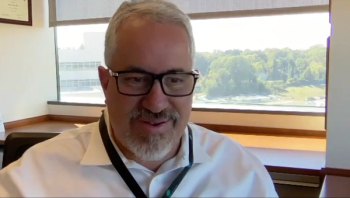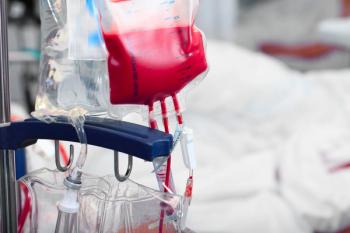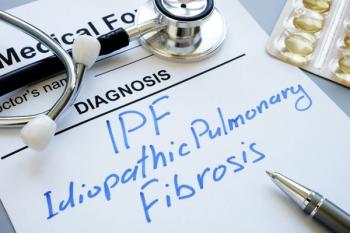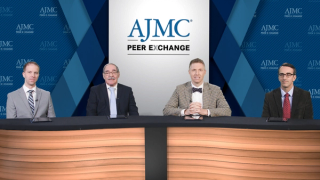
Clinical
Latest News
Latest Videos

CME Content
More News

These findings suggest that KIR2DS2-positive (KIR2DS2+) natural killer (NK) cells could be an attractive therapeutic target for in vivo strategies, although enhanced effector function is lost during ex vivo expansion needed for NK cell–based therapies, such as chimeric antigen receptor–NK cell treatment.

A new study has linked work-related stress to poorer cardiovascular health, highlighting the need for workplace wellness programs to reduce the risk of cardiovascular disease.

Mei Wei, MD, an oncologist specializing in breast cancer at Huntsman Cancer Institute at the University of Utah, discusses new treatments for HR+/HER2- breast cancer and immunotherapy challenges, particularly regarding immune-related adverse events.

Bonnie Qin, PhD, of Rutgers Cancer Institute, emphasizes that moderate improvements in prediagnosis dietary quality can significantly enhance survival rates among Black women diagnosed with high-grade serous ovarian cancer.

Ratios of visceral proteins can act as independent indicators for both overall and progression-free survival in patients with colon cancer.

Maria L. Padilla, MD, Icahn School of Medicine at Mount Sinai, previews that experts will discuss critical management strategies for interstitial lung disease and idiopathic pulmonary fibrosis, including the latest diagnosis and treatment protocol advancements, at Advances in Pulmonary Medicine 2024.

Although polycythemia vera management remains focused on reducing the risk of thrombotic events, there is growing recognition of the need to address the persistent decline in quality of life experienced by many patients.

This new study investigated the impact of COVID-19 on patients with myasthenia gravis, finding that although most patients did not experience severe COVID-19, a significant portion suffered postinfection exacerbations.

Combining a digital intervention with health behavior counseling improved weight trajectories and lowered obesity risk in racially and ethnically diverse children over 24 months.

New treatments for Alzheimer disease don’t reverse cognitive symptoms, but they do significantly slow progression. Evidence suggests that earlier treatment is most effective.

Symptomatic improvement on therapy for myeloproliferative neoplasms (MPNs) is very much based on the individual. Data does show momelotinib not only improved spleen size and anemia but also improved symptomatic burden.

Three proteins—THRAP3, STMN1, and GNA13—are overrepresented in blood cancers like acute myeloid leukemia (AML) and could prove to be novel targets for future therapies.

New legislation would clarify rules around value-based contracts in Medicaid, and a new model is expanding access to gene therapies, explained Adam Colborn, JD, of AMCP.

US drug shortages have decreased from 323 to 277 as of September 2024, yet many essential drugs remain scarce, with 50% of shortages lasting over 2 years due to ongoing supply and manufacturing issues.

Toby Maher, MD, PhD, discusses the various barriers that frequently hinder patients with idiopathic pulmonary fibrosis (IPF) from receiving appropriate treatment and shares effective strategies he has implemented to overcome these challenges.

Novel evidence has emerged from a 16-year study that hidradenitis suppurativa can elevate risks of not only pregnancy and postpartum complications, but of morbidity—particularly metabolic- and immunology-related morbidity—for mother and child in the long term.

Patients with transfusion-dependent β-thalassemia experienced 14.8 hospitalizations annually, according to the findings.

Despite proven benefits, referrals to pulmonary rehabilitation and palliative care for patients with idiopathic pulmonary fibrosis (IPF) in England remain significantly lower than for other respiratory conditions.

The machine learning model shows promise in detecting paroxysmal nocturnal hemoglobinuria (PNH) by assessing electronic health records (EHR) data, potentially transforming the diagnostic landscape for rare diseases.

The long-term response rate for zanubrutinib was better than ibrutinib in patients with relapsed/refractory chronic lymphocytic leukemia (CLL) and small lymphocytic lymphoma (SLL).

When resistance to or failure of hypomethylating agents (HMAs) occurs in acute myeloid leukemia (AML), depleting a ligase called TOPORS may help.

A panel of industry experts discussed the complexities of biosimilars and interchangeability, emphasizing the challenges in adoption, the need for regulatory and legislative solutions, and the importance of education to combat misinformation.

Therapy selection for younger patients with myeloproliferative neoplasms (MPNs) may be different based on the desire for fertility preservation, but they are also at greater risk of their disease progressing, explained Ruben Mesa, MD, FACP, of Atrium Health.

Research presented at CHEST 2024 examined the effect of steroid choice on individuals who have a dual diagnosis of heart failure and chronic obstructive pulmonary disease (COPD).

In a recent meta-analysis, the prevalence of human papillomavirus (HPV), especially types 16 and 18, was significantly increased among patients with ovarian cancer (OC) vs controls.















